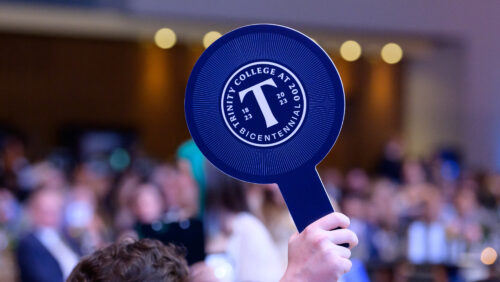Here is a tax-smart way to make an impact to Trinity using your traditional or Roth IRA. The IRA charitable rollover (also called the Qualified Charitable Distribution, or QCD) is a great way to make a tax-free gift to Trinity and satisfy your Required Minimum Distribution (RMD). If you are not required to take an RMD but no longer itemize your deductions, then a QCD may be right for you as well.
How Do I Qualify?
The IRA charitable rollover (QCD) offers multiple benefits for making gifts from your traditional or Roth IRA.
- You must be 70 ½ years or older at the time of the gift.
- Gifts must go directly from your IRA to Trinity.
- Gifts must come from a traditional IRA or Roth IRA account.
- For 2026, total QCD gifts cannot exceed $111,000 per donor.
Benefits of an IRA Charitable Rollover Gift
- If you don’t itemize deductions and are not yet required to take your RMD, a QCD offers all of the benefits of an itemized income tax charitable deduction
- If you are age 73 or older and must take your RMD, a QCD can satisfy your RMD without increasing your income taxes.
- You may direct your gift to a program or area of your choice.
- It is a wonderful way to create an immediate impact on Trinity.
How can I make an IRA Charitable Rollover?
Contact your IRA administrator for their QCD distribution form and information on the procedure to make such a gift. Click here for a sample distribution request letter that you can send to your IRA Administrator to start the process.
The Secure Act and the QCD
The “Setting Every Community Up for Retirement Enhancement” Act, aka the SECURE Act, was signed into law on December 20, 2019. The SECURE Act, which went into effect on January 1, 2020, changes many of the rules governing retirement plans, including several provisions relevant to making charitable IRA rollover gifts (also known as qualified charitable distributions or QCDs.)
Under the SECURE Act, the charitable IRA rollover, or QCD, remains a terrific way to make a tax-free gift to Trinity College using your traditional IRA.
The SECURE Act increased the age at which you must start taking required minimum distributions (RMDs) from 70½ to 72. Once you reach 72, one of the great benefits of a QCD is that it will count towards your RMD. However, even if you have not reached age 72, there are still good reasons to consider a QCD at 70½. First, a QCD offers all the benefits of an income tax charitable deduction, even if you don’t itemize your deductions. You can’t claim a deduction for your QCD, but your QCD is not included in your income. Your QCD is always a tax-free gift.
Another reason to consider a QCD at 70½ is to reduce the balance in your IRA. At age 72 or older, your RMD is based on the balance in your IRA at the end of each year multiplied by a factor published by the IRS. You may be in a position where you don’t want or need the income from your IRA. Higher income can increase your Medicare premiums and create other tax issues. Consider making QCDs starting at 70½ to reduce the balance in your IRA.
Another change brought on by the SECURE Act is the elimination of the stretch IRA for most non-spousal beneficiaries. In prior years, the beneficiary of your IRA was subject to required minimum distributions (RMDs) based on his or her life expectancy. That meant that the IRA assets could continue to grow in a tax-deferred manner over the course of the beneficiary’s lifetime.
Now, with a few exceptions, children and other non-spouses who are more than 10 years younger than you must withdraw and pay income tax on all funds within 10 years. For many younger heirs this will mean that they will have fewer years available to them for tax-deferred or tax-free interest compounding. Therefore, if you are considering a gift to Trinity College now or after your lifetime it may be more tax efficient to use your IRA assets. You can do this either during your lifetime making a qualified charitable distribution (QCD) or by naming Trinity College as a beneficiary of the remainder of your IRA, and then setting aside other assets to pass on to your loved ones.


